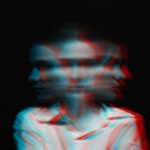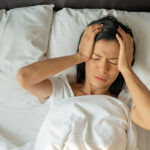A Guide to Bipolar Disorder and Insomnia
Over 2 million people are currently diagnosed with bipolar disorder but the number of people suffering from its symptoms and effects could be much greater. Bipolar disorder is a chronic condition that often requires lifelong treatment. The most common symptoms and side effects include increased energy, loss of touch with reality, and a reduced need for sleep.
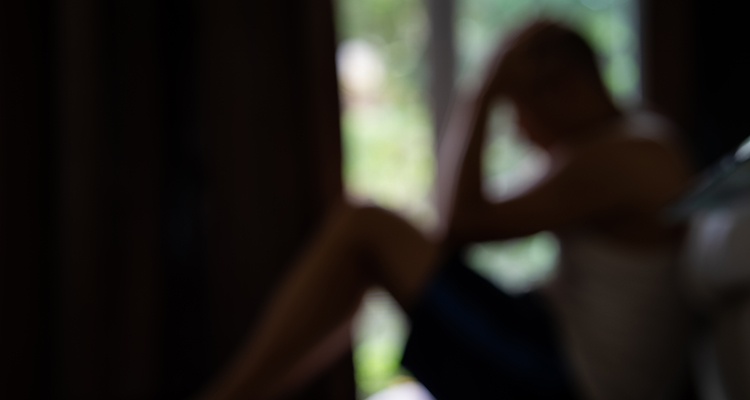
It’s this last symptom that we’ll be addressing here. Many people with bipolar disorder also suffer from insomnia, finding it difficult to fall and stay asleep. While several factors can lead to the inability to sleep, this article will discuss the connection between insomnia and bipolar disorder.
Read on to discover what bipolar disorder is, how it affects sufferers, and what role insomnia plays.
Content
A Closer Look at Bipolar Disorder
Bipolar disorder is a mental health condition that was previously referred to as manic depression. This disorder is marked by extreme mood swings including emotional highs and extreme lows. During “high” moods, individuals feel alert, energized, and manic. “Low” moods are similar to those experienced by individuals with chronic depression.
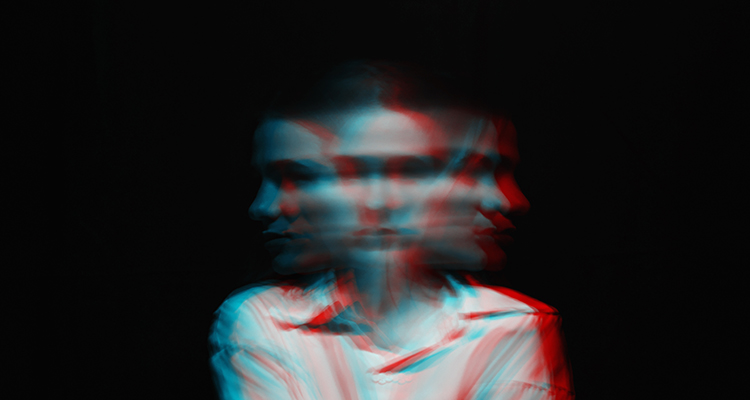
During manic episodes, you may find yourself feeling unusually irritable, energized, or even euphoric. Depressed individuals feel sad, hopeless, and lose interest in daily activities. The constant shift in mood associated with bipolar disorder can drastically affect all areas of a person’s life including energy, behavior, cognitive function, judgment, and sleep patterns.
It’s not uncommon for people with bipolar disorder to experience abnormal sleep patterns. During “high” moods, individuals find it difficult to calm down enough for sleep. “Low” moods are often marked by oversleeping, sometimes for 14 to 16 hours per day. This makes it increasingly difficult to establish a consistent sleep routine and healthy sleep habits.
These mood swings can occur often (several times a year) or rarely (once a year). Every patient is different and requires a specialized treatment plan. As with most mental disorders that negatively impact sleep, treating the underlying condition of bipolar disorder can often help ease insomnia symptoms.
Types of Bipolar Disorder
To better understand the connection between bipolar disorder and sleep, it’s important to recognize the main types of bipolar disorder and their associated symptoms.
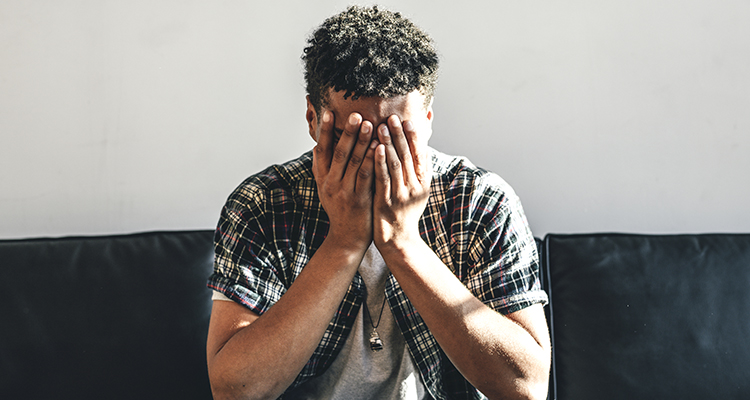
Bipolar I Disorder
Bipolar I disorder is diagnosed following at least one manic episode that is either preceded or followed by a major depressive episode or an instance of hypomanic. Some patients will experience a break from reality, also known as psychosis, as a result of their mania.
Bipolar II Disorder
This type of bipolar disorder is marked by at least one major depressive episode and at least one hypomanic episode. Individuals with bipolar II disorder never experience manic episodes.
Cyclothymic Disorder
Individuals with cyclothymic disorder have had at least two years of symptoms including several periods of hypomania and depression. Depressive episodes associated with this condition are less severe than those experienced by individuals with major depressive disorder.
Other Types of Bipolar Disorder
Some instances of bipolar disorder are related to other underlying medical conditions or may be induced by drug or alcohol use.
Bipolar Disorder Symptoms
There are two distinct moods associated with bipolar disorder — manic highs and depressing lows. Each condition reflects a different set of symptoms and both can negatively impact your sleep and quality of life.

Let’s take a closer look at both conditions and the symptoms associated with them.
Mania and Hypomania
Mania and hypomania are two separate episodes with some of the same symptoms. Mania symptoms are often more severe than hypomania and may cause more noticeable impacts on your daily life. Issues are often present at work, school, in your relationships, and during social activities. In severe cases, mania can trigger psychosis and result in hospitalization.
A manic or hypomanic episode is marked by three or more of the following symptoms:
- Decreased need for sleep
- Racing thoughts
- Jumpy, energized, or wired
- Increased activity or agitation
- Euphoria
- Excessive talkativeness
- Poor decision-making skills (taking risks, making irresponsible financial decisions, etc.)
Increased energy, racing thoughts, and a decreased need for sleep are the most common triggers of insomnia in those with bipolar disorder.
Depression
On the other end of the spectrum from mania and hypomania are the depressive episodes that bipolar sufferers experience. As alert and energetic as a person’s “high” moments, the “low” moments of depression can be extremely dark and troubling. Similar to mania, these symptoms negatively impact your ability to function in daily life, including at work, school, and socially.
- Feeling no pleasure or interest in activities you once enjoyed
- Overall depressed mood including feelings of hopelessness
- Changes in weight and appetite
- Sleeping too much or too little (insomnia)
- Slowed behavior and reaction times
- Lack of energy and fatigue
- Inappropriate guilt
- Feelings of worthlessness
- Inability to concentrate or indecisiveness
- Suicidal thoughts
These overwhelming feelings of sadness can come and go and express themselves in a variety of ways. Individuals who sleep too much when feeling depressed struggle to establish healthy sleep patterns, whereas others struggle to sleep at all during their depressive episodes.
How Bipolar Disorder Affects Sleep
Bipolar disorder and its symptoms can impact sleep in a variety of ways, depending on the person’s mood at the time and other underlying health conditions.
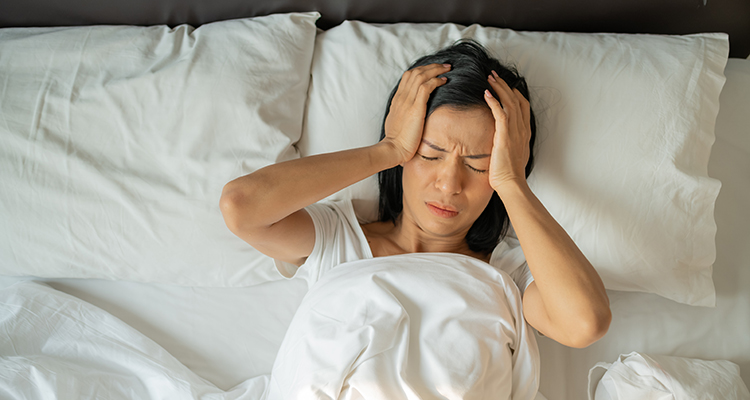
Here are some of the most common ways bipolar disorder negatively impacts healthy sleep patterns.
Insomnia
There are two types of insomnia — acute and chronic. Acute insomnia is short-term and often triggered by a specific event. Chronic insomnia, on the other hand, lasts for three months or more. Individuals with bipolar disorder can suffer from both of these conditions, depending on how frequently their bipolar disorder symptoms surface.
Mania and hypomania associated with bipolar disorder can make it impossible for people to fall and stay asleep. Their bodies and minds are in a constant state of hyper-awareness, unable to calm down or relax enough to sleep.
Irregular Sleep/Wake Cycle
Your body’s circadian rhythm controls your natural wake/sleep cycles. It’s what triggers your body to prepare for sleep at a certain time of night and wake around the same time each morning. Unfortunately, individuals with bipolar disorder can suffer from an irregular circadian rhythm. This lack of a consistent sleep routine can easily confuse your inner clock.
Delayed Sleep Syndrome
Another common circadian rhythm disturbance is a condition known as delayed sleep syndrome. This is a common sleep disorder experienced by those with depression. During delayed sleep syndrome, a person’s sleep patterns are on a two-hour delay, causing you to fall asleep later at night and wake up later in the morning.
Nightmares
As many as 8% of all adults experience chronic nightmares. Night terrors, nightmares, and even vivid dreams are all unpleasant side effects of bipolar disorder. Not only are these dreams terrifying, but they can make it impossible to achieve a quality night’s sleep. Some people delay falling asleep out of fear of having a nightmare while others are woken up numerous times by these horrifying dreams.
Overcoming Sleep Disturbances Caused by Bipolar Disorder
Treating insomnia caused by bipolar disorder often starts with addressing the condition itself. This is true for most cases of secondary insomnia which are caused by other, underlying medical conditions. The difference here is that lack of sleep could mean the difference between a positive day and a traumatic manic episode.
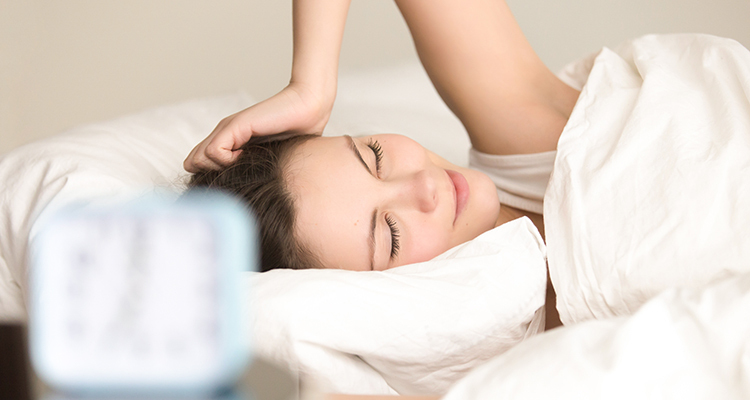
A combination of lifestyle changes and treatment from a medical professional can help combat insomnia symptoms triggered by bipolar disorder. Here are some of the most effective methods and approaches.
Establish a Healthy Sleep Routine
Disruptions in your circadian rhythm are common among people with bipolar disorder. While it can be difficult to combat these sensitivities, establishing a consistent sleep routine can help. Try setting a sleep schedule that involves going to bed and waking at the same time each day. This includes weekends. By doing so, you’re training your mind and body to prepare for sleep at a certain time and to become alert and motivated in the morning.
Use Light Wisely
Too much light before bed and not enough in the morning can also interfere with your quality of sleep. Expose yourself to sunlight or artificial light for at least 30 minutes each morning. This will support the body/mind connection that daylight means it’s time to be awake and darkness means it’s time to sleep.
During a manic bipolar episode, it can be difficult to relax at the end of the day and fall asleep. Associating darkness with sleep can help. Avoid screen time or exposing yourself to bright lights up to 2 hours before your scheduled bedtime. During depressive episodes, some people find it difficult to get out of bed. Exposure to light signals your brain that it’s time to get up and tackle the day! If you have limited access to natural sunlight, a full-spectrum lightbox is a perfect solution.
Ditch Bad Habits
It can be difficult to live a happy, healthy life when suffering from bipolar disorder but it’s not impossible. Ditching bad habits include smoking, consuming alcohol in excess, and drinking too much caffeine can all help support both mental health and sleep quality.
For obvious reasons, caffeine too close to bedtime can make you feel jittery, alert, and restless. Consuming alcohol might make you feel sleepy at first but will result in poor sleep quality and frequent sleep disturbances. Smoking cigarettes is a common habit among people with bipolar disorder. They often use it as a way to relax. Unfortunately, nicotine is a stimulant that can keep sleep at bay. Avoid smoking at least 2 hours before bed or take things one step further and try to quit entirely.
Create a Sleep Oasis
Your bedroom should be for two things — sleep and sex. Many bipolar sufferers lay awake at night, unable to sleep. While it may seem like a good idea to lay in bed until sleep takes over, this can actually make it even more difficult to get a quality night’s rest. Instead, get up and do something relaxing with the lights low. This could be enjoying a cup of hot tea, reading, or meditating. Avoid turning on bright lights or looking at your phone or television screen.
You can also create a relaxing, welcoming bedroom atmosphere. Install soft lighting, invest in an essential oil diffuser, or play soothing music.
Try Natural Sleep Aids
In addition to whatever medication you’re taking for bipolar disorder, you may also want to incorporate natural sleep aids like melatonin and chamomile into your nightly routine. Melatonin is a hormone created by your body that triggers all your internal systems to prepare for sleep. Chamomile is another natural sleep aid that contains calming antioxidants. Having chamomile tea before bed can help induce sleep.
Can Insomnia Cause Bipolar Disorder?
Although the connection between bipolar disorder and insomnia seems clear, there’s another side of the argument to consider. Some people wonder if insomnia and unhealthy sleep patterns can trigger bipolar disorder.

While there’s no evidence to suggest insomnia can cause bipolar disorder, some studies report that lack of sleep can trigger and may precipitate manic or hypomanic episodes.
As many as 65% of bipolar sufferers reported having a social rhythm disruption prior to a manic episode. These disruptions are categorized as any event that impacts your sleep/wake cycle and can be as minor as staying up too late watching TV. Major disruptions include excessive stress over illness, injury, or even a recent death or traumatic event. Studies suggest that individuals with bipolar disorder have more sensitive rhythms which are more easily thrown off-track.
Scientific discussions also surround the development of artificial light and its impact on bipolar disorder. Centuries ago, your circadian rhythm was regulated by sunrise and sunset. Artificial light can confuse your internal clock, and put people genetically predisposed to bipolar disorder at greater risk of developing the condition and related sleep disturbances.
Living a Productive Life with Bipolar Disorder is Possible
A bipolar diagnosis might feel like the end of the world, but it doesn’t have to be. While the symptoms of this disorder can be devastating, there are ways to combat insomnia and improve your overall quality of life.

Armed with your diagnosis and an open mind, you can utilize these techniques alongside other therapies and medications to lead a productive life that includes getting ample rest. Somnus Therapy is designed to facilitate this process. Through a unique approach of therapy, mindfulness, and acceptance, you can overcome your sleep troubles and learn to better cope with bipolar disorder and the associated symptoms.
Click here to start your journey and embrace the new you!

